

Проект «Голоса еврейских местечек. Могилевская область».פיתוח קשרי התרבות בין העמים של ישראל ובלרוס
|
|---|
Поиск по сайту |
|
MainNew publicationsContactsSite mapVitebsk regionMogilev regionMinsk regionBoris Roland
|
WE, THE ONES WHO ARE ALIVE, NEED THIS MEMORIAL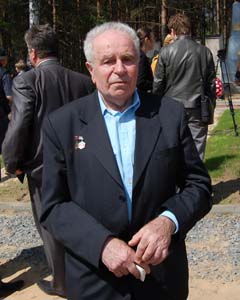 Mendel Rubinson.
Mendel Rubinson.
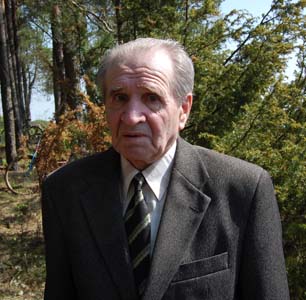 Mikhail Abramovich Harhurin.
Mikhail Abramovich Harhurin.
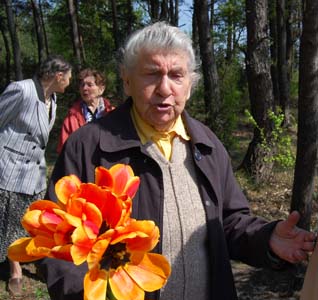 Dina Mordukhovna Fukson.
Dina Mordukhovna Fukson.
Dina Mordukhovna Fukson (her maiden name is Epstein) is a keeper of the Jewish memories of Glusk. The town was once half Jewish – Yiddish could be heard in every street. This is the story she told me: "This land, once covered with blood, is the grave for my husband's whole family: mother, father and three sisters. This is also the grave for my father's brother, his wife and their five-year-old son. When I have insomnia, I have visions of our pre-war street and all of our neighbors. All of them were killed: Leiba Deshkovich and Haske Tsale, Gribe Shmonder and Shmerla Kuka, Izia Shpunt. Only one family survived – the Sokolovskys. There is a memorial on Myslochansky hill, dedicated to the murdered Jews. The memorial was erected in 1958 by the victims' relatives." The idea of a new memorial was brought up several years ago by Naum Sandomirsky – a famous writer and journalist. He is one the five Jews living today in Glusk. The war exterminated all the Jewish families. Two people came to the opening of the new memorial – they had escaped the execution by miracle. 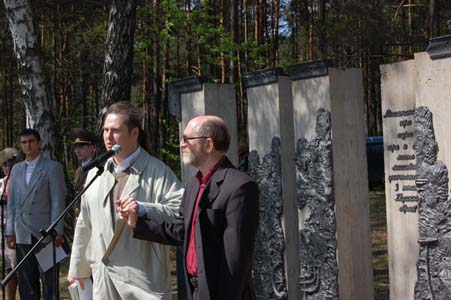 Naum Sandomirsky and Dmitry Kustanovich.
Naum Sandomirsky and Dmitry Kustanovich.
We made short interviews with them. Mendel Rubinson is 81. He was born and spent his childhood years in Glusk. - Did you spend the war years here? - Of course, here. I escaped the execution. 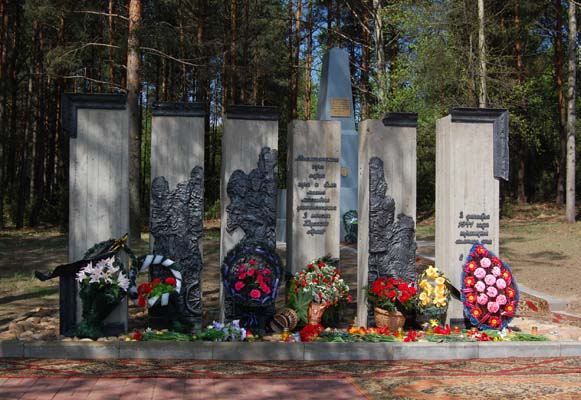 Memorial on Myslochansky hill.
Memorial on Myslochansky hill.
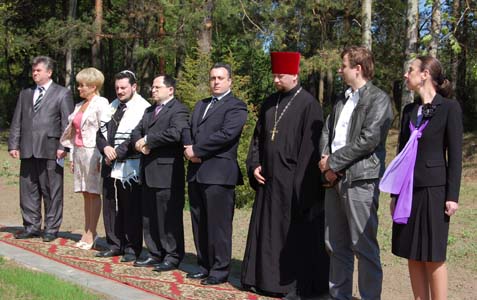
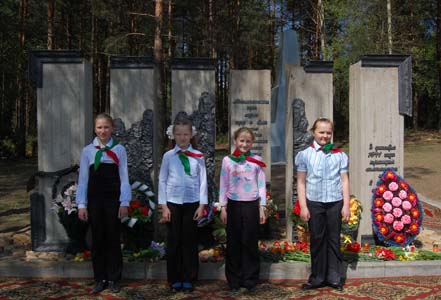
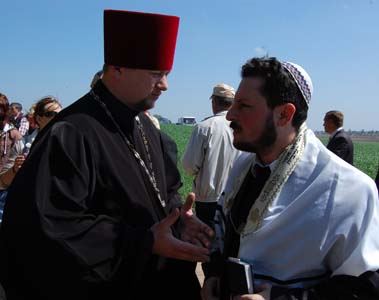
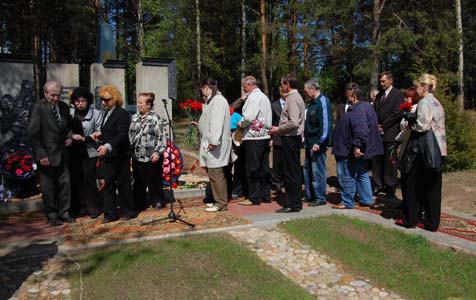 At the opening of the memorial.
At the opening of the memorial.
- How did you manage to do that? - I still cannot understand that. I can remember the small parts of that day. I approached three women standing at the corner of Gorky and Sovetskaya streets. I remember Nazi policemen passing us – they did not notice me because of the women. Then I ran home. I did not find my parents there – they had been taken away. Maria Ivanovna Bobak hid me in her house. I ended up in a partisan zone, where I met my father. Father had been saved by deputy chief of Glusk police, Mikhail Ivanovich Kuleshov. After the war he was sentenced to death. - Was there a ghetto in Glusk? - No, there wasn't. The Jews were allowed to live in their houses until December 9. The executions took place on December 9, 10 and 11, 1943. Very few people survived. I know only eight such people. In the autumn of 1943 and at the beginning of 1944 fascists began to realize they would be held responsible for their atrocities. They forced the prisoners of war to dig out the corpses and burned them. Then the prisoners of war were shot as well. Arkady Shulman,
|
|||
|
|
Jewish settlements in Mogilev regionMogilev• Antonovka• Batsevichi• Belynichi• Belynkovichi• Bobruisk• Byhov• Chausy• Cherikov• Dashkovka• Dribin• Esmony• Glusk• Golovchin• Gorki• Gory• Grozdianka• Hotimsk• Kirovsk• Klichev• Konohovka• Kostukovichi• Krichev• Krucha• Krugloye• Lenino• Lubonichi• Martinovka• Moliatichi• Mstislavl• Naprasnovka• Osipovichi• Rodnia• Rudkovschina• Samotevichi• Sapezhinka• Selets• Shamovo• Shepelevichi• Shklov• Slavgorod• Staroselie• Sukhari• Svisloch• Vereschaki• Zaverezhie• Zhilichi• |
Main |
New publications |
Contacts |
Site map |
Vitebsk region |
Mogilev region |
Minsk region |